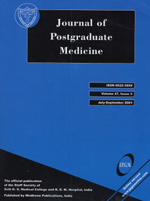
|
Journal of Postgraduate Medicine
Medknow Publications and Staff Society of Seth GS Medical College and KEM Hospital, Mumbai, India
ISSN: 0022-3859 EISSN: 0972-2823
Vol. 56, Num. 2, 2010, pp. 168-169
|
Journal of Postgraduate Medicine, Vol. 56, No. 2, April-June, 2010, pp. 168-169
Letter
Training of postgraduate pharmacologists in India - The need for alignment with the emerging roles in the pharmaceutical industry
Ghosh RK1 , Ghosh SM2 , Datta S3
1 Department of Pharmacology, Maulana Azad Medical College,
2 Department of Anaesthesiology, Lady Hardinge Medical College, New Delhi.
3 Indian School of Business, Hyderabad, MBA Batch 2010, India.
Correspondence Address: Dr. Raktim Kumar Ghosh, Department of Pharmacology, Maulana Azad Medical College, India
dr.raktimghosh@yahoo.co.in
Code Number: jp10046
PMID: 20622402
DOI: 10.4103/0022-3859.65288
Sir, The Indian pharmaceutical industry is one of the largest and fastest-growing amongst the developing countries. A medical pharmacologist can work in various capacities in pharmaceutical companies including drug discovery and development, clinical research, regulatory affairs, patents, manufacturing, sales, medico marketing and laboratory sciences. [1] The current postgraduate curriculum in pharmacology includes learning areas such as research methodology, literature search, biostatistics, animal experiments and a study of common poisons and their identification. [2] This curriculum has not been revised or updated for several decades and is falling short of giving a student adequate training in and exposure to recent developments in pharmacology. [2] Although we agree that the sole purpose of postgraduate teaching is not just to produce industry-ready human resources, nonetheless some of the highly sought-after expertise in the pharmaceutical industry could be included as elective or optional subjects along with the regular postgraduate training. In lieu of the above, we suggest restructuring of the MD pharmacology curriculum by dividing the entire course into six semesters with six months′ teaching in each semester. Some of the special areas suggested by the authors could be taken up as an elective subject in each semester.
- Pharmacovigilance is becoming a promising career choice for medical pharmacologists and all postgraduate students should have a thorough knowledge in some essential areas of pharmacovigilance [Table - 1].
- Training of MD students in the conduct of clinical trials is currently limited to the teaching of the theoretical aspect of trials with minimum exposure to protocol designing and clinical site management. The postgraduate pharmacology curriculum should incorporate some advanced modules on clinical trial conduct and management [Table - 1].
- Pharmacologists in the industry play a major role in selecting the scientific content of drug promotional materials. A student should be adequately trained about the ethical, legal and regulatory guidelines regarding drug advertisement, promotions and marketing.
- A postgraduate trainee needs exposure to advanced software training in different emerging areas of pharmacology like pharmacovigilance, clinical research, clinical data management, regulatory affairs, etc (Aris global, Oracle Clinical, Siebel Clinical, Medi Data).
- A basic module of intellectual property rights (IPR) could be incorporated in MD training to familiarize doctors with issues like infringement, patent searching, patent filing, royalties and damage exemptions for clinical trials.
- Joint MD-MBA degree in line with premier US medical and business schools. Could also be started in the premier medical institutes in India. [3] At least, basic management concepts - including strategy, economics, finance, marketing, operations should be inducted as optional subjects in PG pharmacology curriculum.
- Postgraduate students also need some exposure to pharmacoethics and pharmacoeconomics. Pharmacoethics deals with ethical issues related to the development, promotion, sales, prescription, and use of pharmaceuticals. Uses of pharmacoeconomics in the industry include identification of market, supporting promotional activities, making or justifying pricing decisions, and possibly taking crucial go or no go decisions in drug development [Table - 1]. [4]
All round training of pharmacologists would translate into better patient management in clinical trials, proper reporting of adverse drug reactions, ethical promotion of drug advertisements and increased research and development (R and D) activity in the Indian pharmaceutical industry.
References
| 1. | Shivprakash. Pharmacology: taking it forward. Indian J Pharmacol 2007;39:3-4. Back to cited text no. 1 |
| 2. | Dikshit RK. Postgraduate education in medical pharmacology. Indian J Pharmacol 2007;39:171. Back to cited text no. 2  |
| 3. | Joint degree programmes [online]. Available from: URL: http://www.fuqua.duke.edu/programs/other_programs/joint_degree_programs/.2009 . Back to cited text no. 3 |
| 4. | Walley T, Davey P. Pharmacoeconomics: a challenge for clinical pharmacologists. Br J Clin Pharmacol 1995;40:199-202. Back to cited text no. 4 [PUBMED] [FULLTEXT] |
Copyright 2010 - Journal of Postgraduate Medicine
The following images related to this document are available:
Photo images
[jp10046t1.jpg]
|
